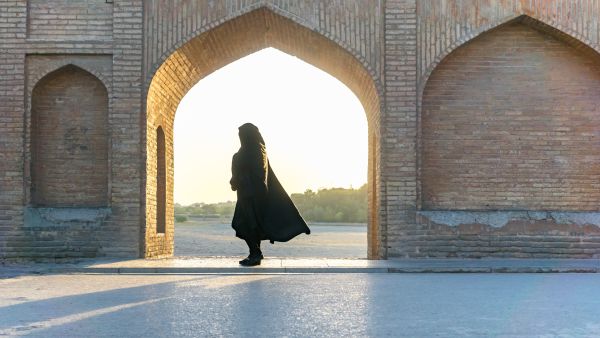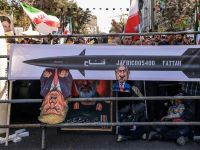ALBAWABA - As protests rocked Iran since 16 September because of the death of Mahsa Amini in a Tehran police station, the authorities maybe getting around to discussing easing on the headscarf and even doing away with making it compulsory.
Iranian women are forced to wear hijab under the current clergy rule, but there was a time when hijab was banned in Iran. Watch how the Shahs and the Mullahs have denied Iranian women their right to choose. @namanxshah pic.twitter.com/rEIKMZHj0C
— The Quint (@TheQuint) November 18, 2022
After the death of Amini the issue become a volatile one with many taking off their headscarf in Iran as a shown of protests against the strict interpretation of the wearing of the headgear as ordered by the new socially conservative president Ebraheem Raisi who came to power in 2021.
Khomeini's house set ablaze in Iran as anti-Hijab protests escalate | Watch https://t.co/4UT3w6TtM6 via @YouTube
— ARUN BHANDARI (@ARUNBHA46067015) November 18, 2022
Prior to that there has been a more liberal interpretation of the wearing of the headscarf especially during the tenure of Hassan Rouhani who was president of Iran from 2013 onwards and told the country's moral police to ease up on the hijab, something that was appreciated by many women in Iran.
“ protests are about choice—elective rather than mandatory hijab—not unlike the demands of abortion rights supporters in the United States”
— Zameer Abbas (@Zameer_abbas21) November 18, 2022
Kiana Karimi @kianakarimi about the women protests in #Iran https://t.co/E3vYQatt7S
The backlash and the mass nationwide protests the death of Amini created was unexpected and despite the violent clampdown by the authorities on demonstrators - at least 342 people, including 43 children and 26 women, were killed by Iranian police and security - people are still in a state of heightened tensions both inside Iran and outside it.
At the funeral of #ArtinRahmani a fourteen-year-old child who was killed in Iran's protests, women take off the mandatory hijab and shout "Death to the Islamic government, death to the mullahs."#IranRevolution #MahsaAmini pic.twitter.com/OFZZxVaVDD
— چَرچی (@Macdism) November 18, 2022
The people for the first time may be forcing the state and politicians to act and become more reasonable despite the fact that judges have not been afraid to pass death sentences on protestors.
Recent news suggest Iranians politicians, MPs and those in the government maybe willing to go for a less austere interpretation of the headscarf. The debate has been summarized in an article recently by Anadolu which suggests the Iranian authorities maybe going for a more lenient approach in the hope for a return to quite life!
?? On the campus, young women, mostly continuing to wear the hijab, danced and shouted: “We don’t want a corrupt guest.” Graffiti mocked Raisi’s own lack of a standard higher education. He went straight to a seminary from primary school https://t.co/sLMImdBCE3
— Vik Puri (@commonerVik) October 12, 2022
The move started on 25 September when the Union of Islamic Iran People Party stated the government need to take necessary legal steps to abolish the mandatory headscarf. On 28 September President Raisi was quoted as saying he would be willing to discuss new ideas to implement the headscarf law. "Values cannot be modified, but the manner in which the law is applied can be debated," he said, adding he would consider ways of considering the issue of morality police patrols who check on proper dress wear.
Iran's regime continues its crackdown on protesters, former speaker of parliament, Ali Larijani, has called for moderation. He says the police should not be enforcing hijabs. Are cracks appearing in the regime's united front? Watch!https://t.co/dLVsbXAhOs
— WION (@WIONews) October 14, 2022
This sparked others in the government to speak out. Former Parliament Speaker Ali Larijani is among them. In an 11 October newspaper interview, Larijani emphasized that the protests have deep political roots and urged a modification of the mandatory headscarf law as pointed out by the Turkish news agency.
Former Parliament Speaker Ali Larijani calls on #Iran regime to rethink its approach to compulsory hijab and the use of "morality police"
— Scott Lucas (@ScottLucas_EA) October 13, 2022
"Do not doubt that when a cultural phenomenon becomes widespread, rigid response to it is not the cure."#IranProtests2022 #MahsaAmini https://t.co/13BVuuMYQK
He was uttering the views of others like retired Brig. Gen. Hossein Alaei, the former Navy commander of the Revolutionary Guards Army, who questioned the patrols of the morality police, suggesting it might make more sense to deploy them against thieves who steal women's phones and handbags.
Hossein Alaei has been a moderate critic of regime since green movement. In 2012 he wrote an article and reminded Khamenei of the Shah destiny & asked him to treat protesters with tolerance, which angered SL supporters & they gathered in front of Alaei house and chant against him
— Ario ? (@Arrio_B) October 18, 2022
He like some other religious figures, although Anadolu reports are limited in number are challenging the compulsory headscarf a practice that has been in force since 1979 when the Iranian revolution was set off. Then prominent religious figures such as Ayatollah Mohammad Beheshti and Ayatollah Mahmoud Taleghani and others rejected the mandatory headscarf.







